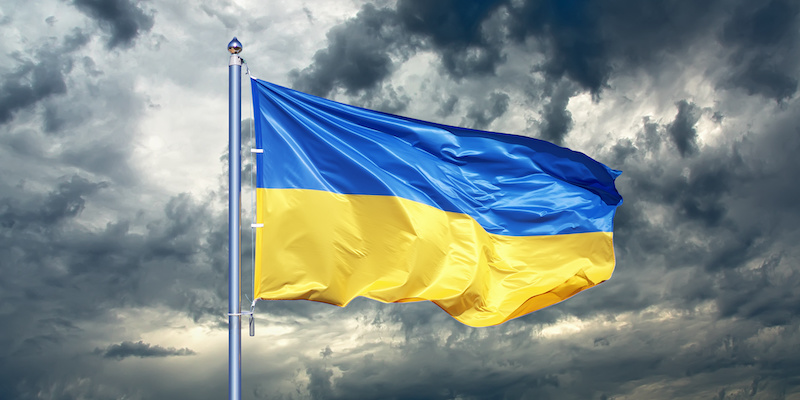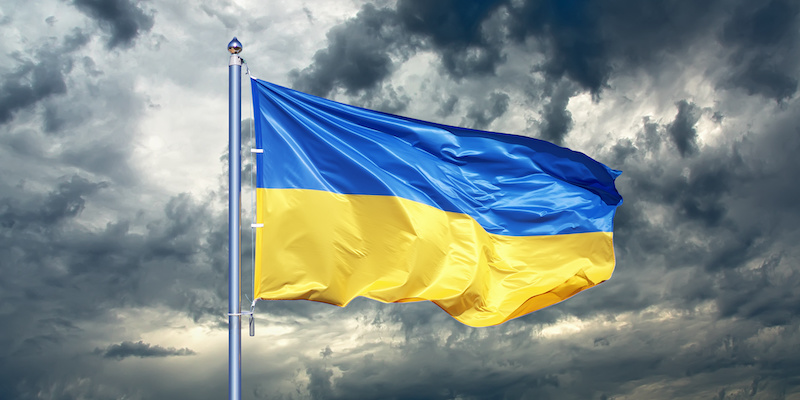Physicists Discuss the War in Ukraine
This week saw physicists from around the world gather in Chicago for the first in-person APS March Meeting since March 2019. For many, the meeting was a welcome return to normality, but not everyone was able to join in the science discussions. Most notably absent were physicists who live and work in Ukraine. At a session devoted to discussing the war in Ukraine, researchers shared stories about friends, family, and colleagues affected by the violence and discussed possible ways to help Ukrainian physicists.
The session started with words from Jonathan Bagger, the APS’s current CEO, who expressed the Society’s condemnation of Russia’s invasion of Ukraine and its solidarity with all people whose lives have been upended by the war. Bagger went on to discuss the actions APS is taking. For example, the APS is offering free membership and free Physical Review journal access to all Ukrainian physicists; it is facilitating stipends that would allow Ukrainian scientists to stay in the region; and it is involved in efforts to help Ukrainian scientists who wish to relocate to the US or other countries. “We want them to stay connected as best as they can,” said Bagger.
Some in the audience said that different measures are called for—ones that address the actual needs of those caught up in the war. One person to voice that opinion was Ivan Oleynik, a physicist with Ukrainian roots who works at the University of South Florida. Oleynik shared a heart-breaking exchange between himself and his cousin who is currently in Kharkiv, Ukraine, a city that has suffered daily airstrikes and shellings since the war began. “Three days ago, she sent me a text saying: ‘We are being attacked. Take care of my daughter, you are the only one left.’”
Oleynik also relayed a conversation from earlier that morning, in which he asked a colleague in Ukraine what physicists abroad could do to help. His colleague said that with every man—and some women—aged 18 to 60 now in the army, “there is no time for science right now, we cannot concentrate on science, send us arms.” Oleynik also called on those listening to the session to write to senators and representatives to ask them to provide more military support to Ukraine. “This is the only [meaningful] thing we can do,” he said.
Another to share her story was Kateryna Pistunova, a Stanford University graduate student who was born and raised in Kharkiv. Pistunova said that it was just after she had finished practicing her March Meeting talk that her phone pinged with the “scariest message” that she’s ever received in her life. “My mom was texting me that [my family] was being shot at.” Pistunova called to offer support, “but my hands were shaking so much I could barely hold [the phone] still.”
Pistunova said that she initially felt that there was nothing she could do to help those in her home country. But that helplessness soon gave way to a strong desire to act. With others at Stanford, Pistunova raised around $350,000 to buy medical supplies that they have already flown to Ukraine. She also put together a website that she said contains “concrete actions that any individual can take.” These actions include donating money and writing letters to elected government officials and to private companies’ CEOs. But, she went on, the actions need to go further. “[Physicists] have to cut ties with Russian educational institutions,” she said. “By supporting [those] national institutions, you’re supporting the [Russian government].”
A call to instead to maintain relationships with scientists of all nationalities came at the APS Prizes and Award ceremony, which followed the special session on Ukraine. In his acceptance speech for the 2022 Lars Onsager Prize, Boris Altshuler, a Russian physicist who has lived in the US for over 30 years, said, “I am ashamed for what is going on and [I] support all the sanctions. But at the same time, I want to ask everybody not to be too cruel to our colleagues both in Russia and Ukraine.” Altshuler said that he believes that most scientists share his same view on the war and that cutting ties is a bad idea.
Responding to calls to boycott Russian scientists, Bagger said that the “APS has a tradition of not supporting boycotts” and is not currently supporting this one. But he added that the situation is changing rapidly, and the APS may reconsider its options. That sentiment was echoed by the current APS President Frances Hellman. “History, of course, will judge how we respond,” she said.
Correction (21 March 2022): A previous version of the article incorrectly stated that there had been no in-person APS meeting between March 2020 and March 2022.
For information on APS programs related to the war in Ukraine, see the website: APS Response to the Russian Invasion of Ukraine.
–Katherine Wright
Katherine Wright is the Deputy Editor of Physics Magazine.





